We may not have the course you’re looking for. If you enquire or give us a call on +44 1344 203 999 and speak to our training experts, we may still be able to help with your training requirements.
Training Outcomes Within Your Budget!
We ensure quality, budget-alignment, and timely delivery by our expert instructors.
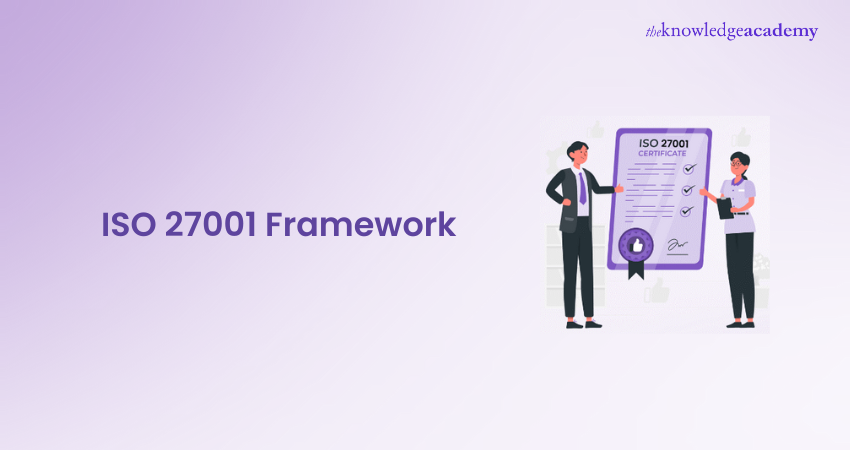
As cyber threats multiply in every nook and cranny of the online landscape, businesses scramble to find ways to create the ultimate ironclad Information Security Management System (ISMS). This is precisely how the ISO 27001 standard empowers organisations. The ISO 27001 Framework is the blueprint for unleashing Information Security's true potential and thwart any attempt at intrusion from the Cyber realm.
If you want a convincing reason as to why you must embrace the ISO 27001 Framework, look no further! This blog dives deep into what this security standard entails, its key benefits and why it's essential for building a resilient and secure modern-day business. So, read on!
Table of Contents
1) What is the ISO 27001 Framework?
2) Understanding Information Security Management System (ISMS)
3) Why is ISO 27001 Important?
4) How Does ISO/IEC 27001 Ensure Data Protection?
5) 14 Domains of ISO 27001 Framework
6) Conclusion
What is the ISO 27001 Framework?
ISO 27001 (also ISO/IEC 27001) is an international standard for managing Information Security. It's the result of a collaboration between two international organisations:
1) The International Electrotechnical Commission (IEC)
2) The International Organisation for Standardisation (ISO)
Here are some important points to remember about this security standard:
1) The ISO 27001 Framework is part of the ISO/IEC 27000 series of standards.
2) ISO 27001 is not compulsory for organisations to implement, but it can deliver many benefits to their ISMS.
3) It helps organisations of varying sizes protect their information by providing a systematic, risk-based, and cost-effective approach to Information Security.
4) ISO 27001 is not a standalone Framework. It requires input from management and other organisational decision-makers to identify the security threats, risks, and vulnerabilities that can impact their information.
Understanding Information Security Management System (ISMS)
An information security management system (ISMS) consists of the ISO 27001 Framework, which ensures that an organisation’s vital data and digital systems remain secure. An ISMS accomplishes this by outlining security procedures, policies, and controls designed to protect data and keep it accessible only to qualified individuals.
An ISMS describes the technical procedures and tools required to protect digital assets, including strategies to keep employees informed about how they can contribute to the organisation's security.
Principles of ISO 27001
The three principles of ISO 27001 protect three crucial aspects of information:
1) Confidentiality: Information can only be accessible by authorised persons.
2) Integrity: Information can only be changed by authorised persons.
3) Availability: Information must be available to authorised persons whenever needed.
ISO 27001 Controls
ISO 27001 Annex A consists of 14 domains and a total of 114 ISO 27001 Controls for compliance. However, you only need to implement the controls that are essential for your organisation. These domains are explored later in this blog. It must be noted that IT security is not the only area of focus for these controls; they extend to human resources, legal compliance, managing processes, physical protection, and various other areas of organisational management.

Why is ISO 27001 Important?
ISO 27001 is crucial because it is a globally recognised Standard for Information Security Management. It helps organisations to protect their information assets from cyber threats and other risks and to comply with legal and contractual obligations. Organisations can reap the following Benefits of ISO 27001 by adhering to best practices:
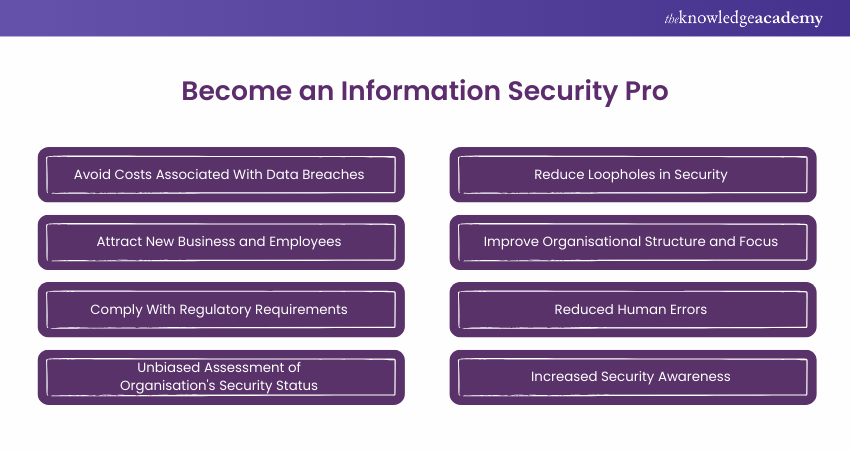
1) Data breaches can cause organisations significant losses, including:
a) Fines
b) Lawsuits
c) Reputational damage
d) Loss of customers
ISO 27001 Key Features help organisations prevent and mitigate data breaches by implementing strong security controls and policies.
2) Certification in ISO 27001 can give organisations a competitive edge in the market, especially in international contexts. It can also increase customer loyalty and trust, as well as employee satisfaction and retention.
3) ISO 27001 Checklist helps organisations to meet the expectations and obligations of their customers, partners, regulators, and other parties. It also helps organisations to avoid penalties and sanctions for non-compliance.
4) ISO 27001 provides a clear and consistent framework for managing Information Security across organisations. It helps organisations to:
a) Define ISO 27001 Roles and Responsibilities
b) Set objectives and targets
c) Monitor performance and progress
d) Improve continuously
5) Human errors are one of the main causes of Information Security incidents. ISO 27001 helps organisations reduce human errors by: Providing training and awareness programs
a) Establishing policies and procedures
b) Enforcing accountability and discipline
c) Promoting a culture of security
6) ISO 27001 helps organisations to streamline their Information Security processes by eliminating waste, duplication, and inconsistency. It also helps organisations to leverage best practices and proven methods from other organisations and experts.
Professional who are involved in internal audits in ISMS can benefit from ISO 27001 Internal Auditor Training now – Sign up now!
How Does ISO/IEC 27001 Ensure Data Protection?
ISO 27001 ensures enterprise-level information security by offering companies a set of internationally acclaimed standards that align with each organisation's distinctive structure and function. These guidelines:
1) Establish effective risk management procedures for assigning data protection duties across an organisation.
2) Establish specific security objectives so the company can continuously monitor its data protection.
3) Incorporates regular risk analysis assessments to ensure that any changes to the organisation's systems will continue to support its information security.
Secure your organization's data with ISO 27001 Training. Sign up now to master compliance and Information Security!
14 Domains of the ISO 27001 Framework
The framework consists of 14 domains, each containing a number of Controls that specify the requirements for implementing and maintaining an ISMS. The 14 domains are:
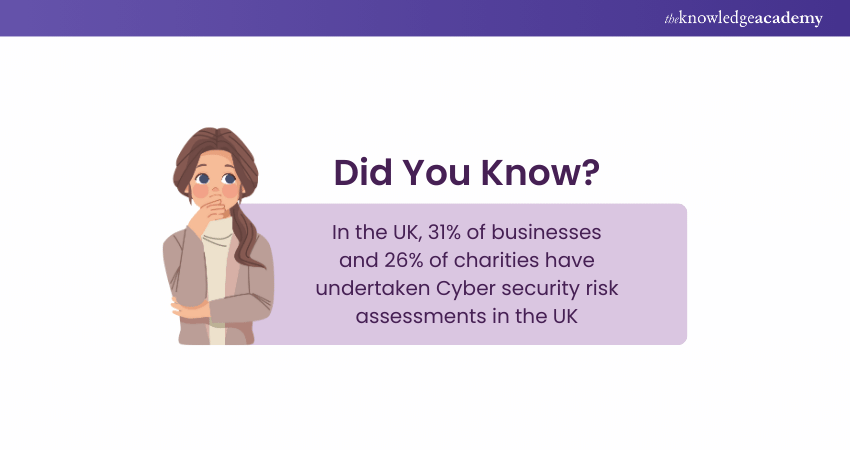
1) Information Security Policy (A.5)
This domain serves as the foundation of ISMS, outlining how an organisation should handle Information Security policies.
2) Organisation of Information Security (A.6)
This domain defines the organisational structure of Information Security, including roles and responsibilities of individuals and employees.
3) Human Resource Security (A.7)
This domain covers the security aspect of human resources, including information assets under the control of an individual or employee.
4) Asset Management (A.8)
This domain covers the identification, classification, and control of assets used in Information Security.
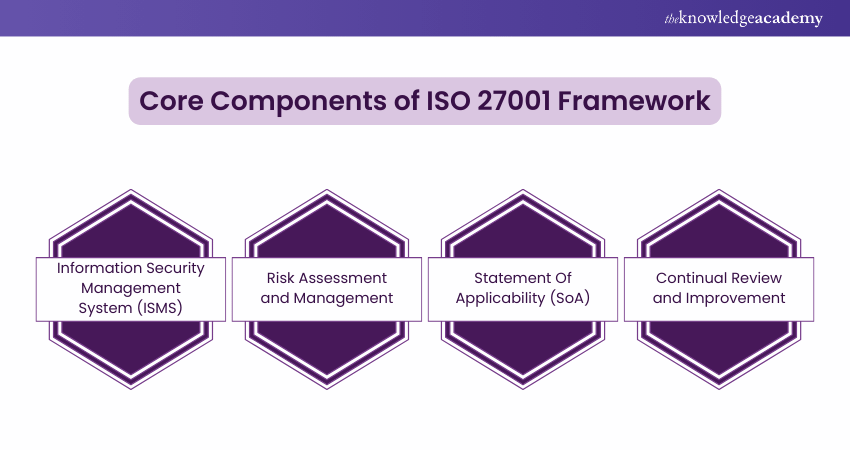
5) Access Control (A.9)
The Controls in this domain limit or control access to information assets, including both logical and physical access controls.
6) Cryptography (A.10)
This domain describes the proper use of encryption to protect the confidentiality and integrity of confidential information.
7) Physical and Environmental Security (A.11)
This domain is concerned with the security of physical assets, equipment, and facilities to protect against both human and natural interventions.
8) Operations Security (A.12)
This domain describes how the organisation’s operating system, software, and Information Technology (IT) systems should be protected.
9) Communications Security (A.13)
The Controls in this domain are for protecting the Information Security risks related to communication networks, including infrastructure and services.
10) System Acquisition, Development, and Maintenance (A.14)
The Controls in this domain ensure that Information Security is maintained during the upgrading or purchasing of Information Systems.
11) Supplier Relationship (A.15)
This domain explains how third-party security performance should be monitored and ensures that suppliers or partners follow appropriate Information Security Controls.
12) Information Security Incident Management (A.16)
The controls in this domain are related to the management of security incidents.
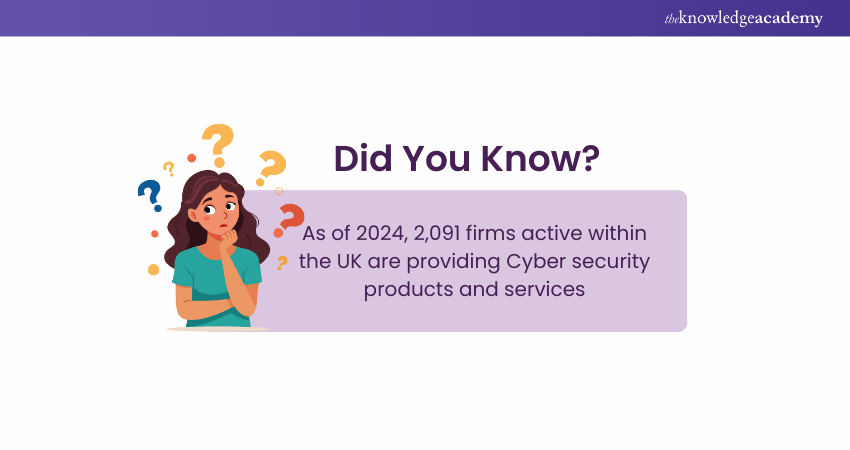
13) Information Security Aspects of Business Continuity Management (A.17)
This domain describes the measures that must be taken to ensure that business operations are unaffected in the event of any Information Security incidents.
14) Compliance (A.18)
This domain details the framework to prevent legal, statutory, regulatory, and contractual breaches.
Are you looking to lead audits of an ISMS that complies with ISO 27001 standards? Our ISO 27001 Lead Auditor can help you - Sign up now!
Conclusion
In today’s world of rising Information Security threats, the ISO 27001 Framework can provide a competitive advantage, build customer trust, and ensure business resilience. Organisations that prioritise Information Security and implement ISO 27001 to reap the benefits of a strong and effective Information Security Management System (ISMS).
Want to learn the basics of the ISO 27001 Framework? ISO 27001 Foundation Course can help you nail the basics of ISO 27001.
Frequently Asked Questions

Here are the key components of the ISO 27001 Framework:
a) Information Security Management System (ISMS)
b) Risk Assessment and management
c) Statement of Applicability (SoA) listing all security controls applicable to the ISMS
d) Continual Improvement
e) 14 Key Domains, including information security policy, asset management, access control, cryptography and more

The ISO 27001 Framework significantly elevates risk management through:
a) Risk assessment and treatment
b) Continuous monitoring and review
c) Improved risk awareness

The Knowledge Academy takes global learning to new heights, offering over 30,000 online courses across 490+ locations in 220 countries. This expansive reach ensures accessibility and convenience for learners worldwide.
Alongside our diverse Online Course Catalogue, encompassing 19 major categories, we go the extra mile by providing a plethora of free educational Online Resources like News updates, Blogs, videos, webinars, and interview questions. Tailoring learning experiences further, professionals can maximise value with customisable Course Bundles of TKA.

The Knowledge Academy’s Knowledge Pass, a prepaid voucher, adds another layer of flexibility, allowing course bookings over a 12-month period. Join us on a journey where education knows no bounds.

The Knowledge Academy offers various ISO 27001 Courses, including the ISO 27001 Foundation Course and the ISO 27001 Internal Auditor Course. These courses cater to different skill levels, providing comprehensive insights into What is ISO.
Our ISO & Compliance Blogs cover a range of topics related to ISO standards, offering valuable resources, best practices, and industry insights. Whether you are a beginner or looking to advance your knowledge of ISO, The Knowledge Academy's diverse courses and informative blogs have got you covered.
Upcoming IT Security & Data Protection Resources Batches & Dates
Date
 ISO 27001 Foundation
ISO 27001 Foundation
Mon 27th Jan 2025
Tue 22nd Apr 2025
Mon 28th Jul 2025
Mon 27th Oct 2025
Mon 15th Dec 2025







 Top Rated Course
Top Rated Course


 If you wish to make any changes to your course, please
If you wish to make any changes to your course, please


